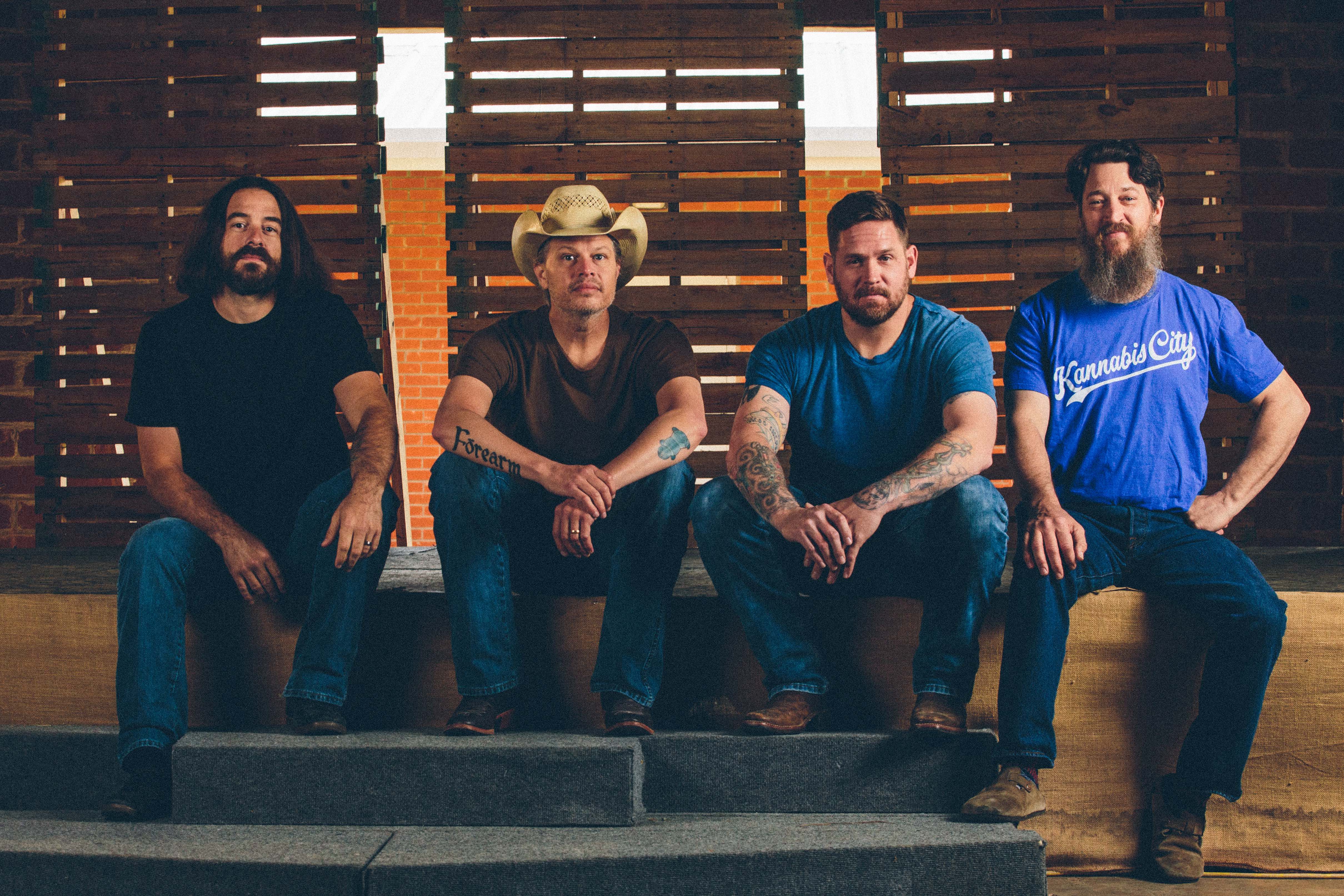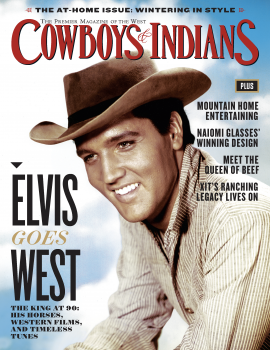
American “red dirt” country frontman Jason Boland talks with C&I about the band’s new album, Hard Times Are Relative.
Oklahoma’s down-and-gritty country band Jason Boland & The Stragglers — composed of lead singer and guitarist Jason Boland, drummer Brad Rice, bassist Grant Tracy, and mandolin player Nick Worley — drop their ninth album, Hard Times are Relative, May 18.
The new record finds their music more established than ever.
Now based in Austin, Texas, Boland (who originally hails from Oklahoma) and his band are known for their down-home tunes and traditional country twang. Hard Times Are Relative showcases the best of the band. The happy-go-lucky album opener, “I Don’t Deserve You,” kicks things off with a positive attitude that lingers throughout the rest of the 11 tracks.
Other album standouts include the violin-driven ballad “Going Going Gone,” the toe-tapping pedal-steel tune “Bulbs,” and the moving title track.
Recently, we caught up with the singer-songwriter to talk about the new record, the upcoming tour, and his love of heavy metal.
Cowboys & Indians: You have an album coming out in a couple of days. What do you hope your fans will get out of Hard Times Are Relative?
Jason Boland: With all our records, I hope they get to have a rich experience from it. We like it to be multidimensional, so it’s a little bit for everybody on there. I think the main thing we still do is traditionally inspired country music. It’s a good one. We had a lot of fun recording this, and I think that still comes through in the process. ... We recorded down at Yellow DOG with Dave Percefull and Adam Odor in Wimberley. They have a beautiful place out there and they’re just great dudes to work with.
C&I: Are there any memorable stories from getting this album from concept to an actual album?
Boland: The recording process always has little memorable points that happen. I mean, for me, the first one that popped into my head was watching Dave, the producer — and he owns the studio — watching him run one of the delay tape machines or something, just the hands-on process that we go through. It’s tech stuff, but we record tape-to-tape. We don’t use computers. We don’t use ProTools or anything, so it’s a little more gritty, but it’s fun. It’s the way we like to do it, and it’s the way we think we sound the most like ourselves, which is what we’ve always really set out to capture, because so many people can do the polished, produced thing, and that’s its own genre, almost — the entertainer genre. I think we’ve always fallen more in that singer-songwriter ground, where you need to record it honestly and play it for as many people as you can on the road.
C&I: Speaking of singer-songwriter, what inspired you for this round of songs? What were the topics that you really wanted to dive into?
Boland: We’ve been doing it so long, there’s not some giant backlog of unrecorded songs because by now, we would’ve probably recorded them at some point. Anything that I’ve written in the past — so the last several albums — we’ve just been writing and recording as we go. It’s really where we are in our lives. It’s where the world that we look out at is, what’s its place right now. I think the inspiration, like all of them, has just been life and what’s been going on with us. I think that’s why our albums end up representative of that, and that’s why I always speak to the highs and lows and twists and turns of them — because they’re just us writing and recording things as they happen to us. And you don’t have to look very far. You know, if you have a group of humans, you don’t have to look very far to find something to crow about or complain or whatever we feel the need to write a song for.
C&I: Since the release of your debut album, Pearl Snaps, how do you think your music has evolved?
Boland: Like with everything in life, you gain perspective — that’s one of the biggest things. You just have more to write about, really. The other thing, as a band, just because we grew out of the garage scene that was going on in the late ’90s in Tornado Alley, I think we’ve really evolved musically as a band in ways that I’m completely happy with. I can still listen to the old stuff and hear it nostalgically. But as far as music that I would listen to today, I think now we’re a lot closer to a band that I’ve always heard.
C&I: How did you guys all meet and come together?
Boland: There’s three original band members left, and that’s, of course, myself, Brad Rice, and Grant Tracy. Brad Rice and I knew each other and Roger Ray, the original guitar and steel guitar player, [we] grew up with Grant Tracy. I met Roger hanging out around a campfire, picking, and the rest is history. We got together and happened to be in Stillwater [Oklahoma] at a time where there was just a lot going on. There was a lot of bars hiring live music and a lot of people going out to watch live music. And we all just thought it made sense and we just kept doing it. Roger actually still plays with us from time to time and we’re still very close.
C&I: Out of this upcoming album, do you have a favorite song or track that you’re most proud of?
Boland: I think everybody always alludes that, “That is like trying to pick one of your favorite kids,” which it’s nothing, I’m sure, like that at all. My favorite song — and it jumps around from time to time — I think is “Hard Times Are Relative,” because I think that’s still what made me want to put it as the title track. It’s just a groovy little story that flows through and it has a fun message. I don’t know — the hook at the end, the surprise, makes me smile.
C&I: Who are some singers and songwriters that have inspired your creative development and made you want to become an artist?
Boland: Mike McClure was one of the biggest ones, and The Great Divide. And then all the other people that were inspiring them, like Bob Childers and Tom Skinner— all the Stillwater people. And then we started listening more and more to what was going on in the Texas scene, too, like Robert Earl Keen. He was a huge influence, just as it all goes, that’s the way he ran his own business and toured and released albums, and all the while, it was to support wonderful songwriting. Wouldn’t just stop there, just to be out there. It was somebody that was doing it for all the right reasons.
C&I: Are there any songs that didn’t make it onto the album that we can expect later on down the road?
Boland: I don’t think we looked at any others right now that were in this batch. In fact, “Bulbs” was one; it’s a bonus track on this record. It’s a Van Morrison song that we were going to put on the last record and we actually salvaged it from the tape from the last sessions. We found out that the tape we had used was deteriorating rapidly, so we put it on the machine, and, sure enough, it was starting to come apart a little bit. So we lucked out to pull one song off of the stuff that was left over from the session before. But we usually record and get down everything we go after when we do. And I don’t finish a lot of songs that I’m not interested in recording, so I’m not a “sit down on 9-to-5 and see how many songs I can turn out” kind of writer. I do what I’m moved to and it always tends to be the right amount at the right time.
C&I: What’s something fans might not know about you?
Boland: I bet some hardcore country fans will probably be shocked at some of my musical choices. ... I listen to some pretty hardcore metal and whatever else on that end. And then — and this goes for pretty much everybody in the band — we listen to a lot of experimental and prog and all that. Everybody listens to some form of jazz or acoustic music, from Dave Grisman. And then a lot of intelligent hip-hop, like Immortal Technique or Dead Prez. ... I would think maybe the hardcore old-school country fans think we sit around and listen to vinyl of classic country and nothing else. I would think they would be really shocked if they actually heard some of the stuff we listen to. Our rock goes further than AC/DC.
C&I: What metal bands are your favorites?
Boland: Brad and I are both big Between the Buried and Me fans. I like High on Fire, but we’re straightforward rock that a lot of people would know and listen to — Queens of the Stone Age and any of the El Paso lineage, like At the Drive-In, Sparta, The Mars Volta.
C&I: You’re from Stillwater, Oklahoma, but now you’re based in Texas. What are some of your favorite places to visit when you’re not on the road with the band?
Boland: Mandy, my wife, and I, we like to go to Liz Lambert’s hotels around here when we’re bumming around. Like, out to Marfa, the Hotel Havana and all the Austin ones, Saint Cecilia. Those are the fun ones. ... They’re all pet-friendly, so we can take our English bulldog named Gary. I like to just travel around and eat good food and listen to other people play music. That’s the other thing is being so busy with always making music and playing it, we’re first and foremost music fans. So you try to find, believe it or not, time to go watch bands. That’s probably another thing that fans would think was crazy. It’s like, “What do you do with your spare time?” “Oh, we go watch bands when we can.” That goes for everybody in the band: Grant, Brad, Nick — they’re all avid music watchers.
C&I: Do you get inspiration from those performances as well?
Boland: Yeah, you do. You don’t take the inspiration as far as, “Go do it.” I usually don’t try to listen to other people’s songs and use them as “Oh, I need to go write one like that” or anything. In fact, that’s something I try to guard against, which, I think is sometimes why we’ll go watch something outside our genre, almost preferably, sometimes ... especially depending on where you are in your creative process. In the middle of making a record, you may not want to go watch a bunch of bands [that are] in your vein or your style of music.
For more information on Jason Boland & The Stragglers and their upcoming tour dates, visit their website.
More Q&As:
Dave Simonett of Trampled by Turtles
Singer-songwriter Parker Millsap
Singer-songwriter Charlie McNeal












